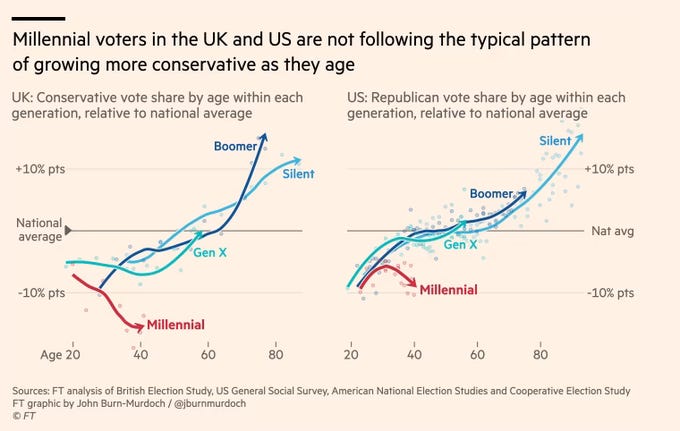The Republican Party is doomed.
I don't mean they'll lose every election moving forward. My case, rather, is this: they know exactly what they want someone to do, but in an increasing number of institutions, there is no one left to do it. Increasing age and education polarization means that Republicans are rapidly losing the capacity to run public institutions at all levels other than electoral, and this trend cannot realistically reverse within a generation. The near-term future is already written.
The demands of a two-party system mean each party will typically adjust over time to capture, if not 50% of the electorate, at least enough to remain meaningfully competitive. There is no reason to expect that to change. Republicans are electorally competitive and will likely remain so, particularly given their advantage in rural areas with greater Senate representation. People zero in on that, but electoral politics is a small part of governance writ large.
I am one of the most conservative students at my law school. More specifically: I, a gay, centrist Biden voter, am one of the most conservative students at my law school. The Federalist Society here is anemic and widely derided, while there's a dizzying array of progressive organizations. The professors and administrators are, if anything, even more progressive. My school is in no sense an outlier in this regard, nor is this specific to law. The same patterns are overwhelmingly visible in every group of educated, young professionals.

People want to say young and educated people have always leaned left, but that simply is not true. Not like this. The leftward skew is a recent, and accelerating, phenomenon. Democrats have gained more and more ground among young and educated people alike, and the rightward shift people are used to seeing just isn't happening as it did before. Among young, educated professionals, the salient political divide is no longer between Republicans and Democrats, but between liberals and various stripes of socialists.

What's the conservative coalition? Truckers, farmers, business owners, construction workers. Don't get me wrong: these are useful, socially valuable, necessary professions. But they have nothing to do with the day-to-day of governance on the ground. About the only governance-related profession they remain influential in is the police force, which tells you all you need to know about the current reputation of the police force among educated, young professionals.
This means that, for the medium-term future, Republicans are dealing with a coalition of the high and low against the middle when it comes to politics. They authentically represent, to one degree or another, somewhere near half of the country. They have representation at the highest levels of government, controlling the Supreme Court, maintaining razor-thin margins in the House and Senate, and remaining competitive within Presidential races. But because their voters are increasingly old, rural, and less educated, they lack all but the slightest foothold in the great majority of institutions run by and filled with young, educated professionals: that is to say, the great bulk of institutions involved in the day to day of governance.
The field of education provides a good case study as to how this plays out. Educators are overwhelmingly progressive in their inclinations. Left to their own devices, they will take a policy and curricular stance broadly in line with progressive sensibilities. Teacher's unions are unambiguously and emphatically against the Republican Party. Conservatives like to emphasize school choice, pointing to charter and private schools as potential alternatives, but even there, the great bulk of educators are politically liberal. Eva Moskowitz, founder of high-achieving charter school system Success Academy, champion of school choice advocacy, and a model of what conservatives point to as an ideal in education, is a registered Democrat.
The most successful recent conservative education advocacy movement, Moms for Liberty, tells you all you need to know in its name: it is a movement not of educators or of students, but of parents looking from the outside at a system that broadly opposes their values. Florida politicians have spent enormous political capital to pull a single, tiny liberal arts college towards a conservative ethos.
Here's the problem: by the time you're trying to legislate every one of your preferences, resisted at every level by the people put in place to enact those preferences, you've already lost. Republicans want people who want to enact their values. What they've got is equal representation in the part of the government that can swing a big stick around trying desperately to corral a group where even the educators supported by their policies are likely to want nothing to do with them.
What of the rising stars in each political party? For the Democrats, you have Pete Buttigieg: working within the institutions at every step, from Ivy League to consulting to military to local governance and smoothly into high-level tasks within his own party, focused on technocratic proposals dependent on high state capacity. For the Republicans, there's Vivek Ramaswamy: downplaying his past within those same institutions, rising to incredible wealth via private enterprise, smashing into the scene of his own party as an outsider obviously loathed by those who have spent their lifetimes within it, focused on a libertarian "burn it down" ethos. To be a popular Republican in the Trump era, you almost need to be an outsider promising to tear the government to pieces.
Conservatives right now are desperate for public intellectuals who reflect their values. As soon as a conservative-coded intellectual shows a modicum of talent or originality, they skyrocket into prominence. Jordan Peterson spent a career in obscurity in academia before a fight over pronouns launched him into an enormous platform with millions of followers. Chris Rufo became one of the leaders of the conservative movement in moments after speaking cogently about critical race theory. Richard Hanania, despite constantly telling conservatives how stupid and ineffectual he thinks they are, has gained a massive conservative fanbase by virtue of being able to argue coherently for some of their values.
Perhaps most telling is the example of Aaron Sibarium, recently profiled for Politico: perhaps the most prominent conservative investigative reporter today, a secular Jew who voted for Clinton and Biden but, because he opposes social justice progressivism, has sauntered into the wide-open niche of investigative journalism from a conservative point of view. Why is he filling that role so effectively? Simple: there was nobody else to do so.
On a smaller scale, even a few tweets that capture the conservative zeitgeist can shoot someone into the public eye overnight, as Darryl Cooper (MartyrMade) discovered when an articulate defense of the 'stolen election' feeling took him from 7000 Twitter followers one day to 55000 three days later, or Kulak of
found as he went from no public presence to being the rising voice of the burn-it-down ethos in a matter of a few months of well-written diatribes. Costin Alamariu launched an obscure work of academic philosophy to the top of the Amazon charts off the strength of an absurdist right-wing pseudonymous persona. Ask any of them what they think of the institutional Republican Party sometime.Conservatives are so desperate for a shred of cultural influence that they turn people like Oliver Anthony (“Rich Men North of Richmond”) into overnight sensations, only to learn that they, too, have nothing but scorn for the Republican Party.
Put simply: right now, at the nuts and bolts of governance, the Republican Party has a much shorter bench of talent than the Democratic Party. Even conservative intellectuals are trained in overwhelmingly progressive institutions. This affects every level of politics, but since it doesn't necessarily harm them electorally, there's no incentive to course-correct at the level of electoral politics. Quite the opposite, in fact: every single Republican politician, and every single conservative influencer, benefits individually from their coalition’s weakness among young, educated professionals. In many ways, they’re living the dream: massive audiences hungry for competence with little competition fighting to provide that competence in any given field.
Some want to frame it as institutional capture, a battle against the ruling elite, that could be corrected if the right people are in charge. Is there some of that? Sure. But at most institutions, it's a simple function of the politics of the people seeking those institutions out. My law school is not overwhelmingly progressive because the Powers That Be want it to be progressive. It's overwhelmingly progressive because progressives showed up. You can only stretch the word "elite" so far, and by the time you get down to schoolteachers, you've stretched it past the breaking point.
Conservatives, to be clear, aren't going anywhere, nor is the growing dissident right movement. But even when Republicans win electoral power, they lack the human capital at all levels of governance to accomplish what they really want with it. Under Republican rule, half of top government officials work to enact the approximate will of slightly less than half of Americans while virtually every educated, young professional anywhere near politics resists any way they can. Only a few have even the vision of changing this by re-entering those institutions, with most seeing no recourse beyond slowly fading or burning every institution to the ground.
The Republican Party will remain visible. It may even continue to win elections. But at the basic tasks of governance and defining culture at all levels, its death warrant has already been signed. The Republican Party is doomed.
Originally workshopped on Twitter. Presented here with some modifications.






Trends in dynamic systems don't proceed in straight lines, though over short time horizons, they may appear to be that way. But it doesn't take a long journey back through history to see that things that look ascendant over a period of years in the past end up in decline, and things in decline end up ascending. It's not to say that this is always the case, but I would look more closely at past dynamics to see what early signs there were of counter-balancing trends. For example, while it may be true that millenials are trending progressive, zoomers are showing signs of a swing toward conservativism. That may be because millenials have grandparents who said racists things, but zoomers do not. For zoomers, racism is abstract and hypothetical. But they see rise (and shocking justification of) crime and disorder, and a breakdown of social trust. To them and their predecessors, anti-racism may feel bizarre, stodgy, and inadequate to address the needs of the time, and they find themselves open to other approaches. If things get worse relative to the past, it would not be surprising at all if they look to resurrect ideas from the past to try to recreate some of those past conditions.
The only way recent trends will be permanent is if they actually result in a better society, and if there's one thing that people seem to agree on these days, it's that things are getting worse. Whatever emerges, it won't be the same as the ruling class today. Their days are dwindling as fast as their failures are mounting.
I'm increasingly convinced this is all just Trump, and will end with him. Which should be pretty soon, as he's 77, losing a step, and in legal trouble.
He led a revolt of the Republican base against the Republican elite and was hugely successful, to the extent that the public brand of the party now entirely reflects the formerly neglected priorities of the base. Most educated professionals - me included - find those priorities extremely unpalatable, hence the realignment covered in the article.
But, it's going to be temporary. It's becoming increasingly clear that Trump is a one-off, as other politicians attempt to replicate his appeal and keep flopping. See the 22 midterms and the Desantis and Ramaswamy campaigns. Likewise, intellectual efforts to market the Trump base's priorities to the educated class are completely falling flat.
So what happens next is that Trump exits stage left, the base revolt gets bored and wanders off without its evidently irreplaceable frontman, and the former Republican elite's priorities creep back in. Those priorities - free markets, American strength in foreign policy, limited government and pro-business policy, etc. - are much more appealing to educated professionals. They will return to the party.
As evidence this will happen, consider the speaker of the house fracas. Even with Trump very much still on-stage, the revolt commanded fewer than half the votes in the house, couldn't even get their candidate nominated until third try (after McCarthy and Scalise) and then couldn't get him confirmed. When push comes to shove, they're already a minority within the party. When Trump goes, they go too.